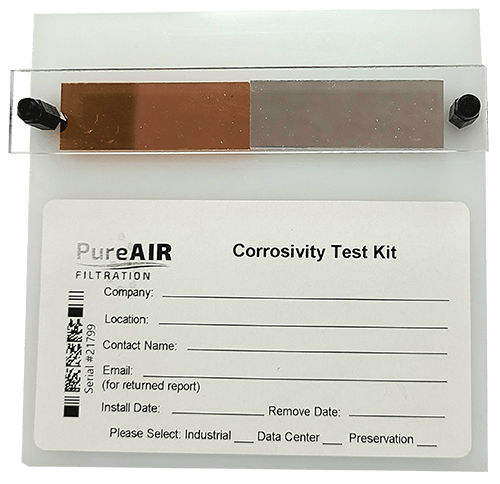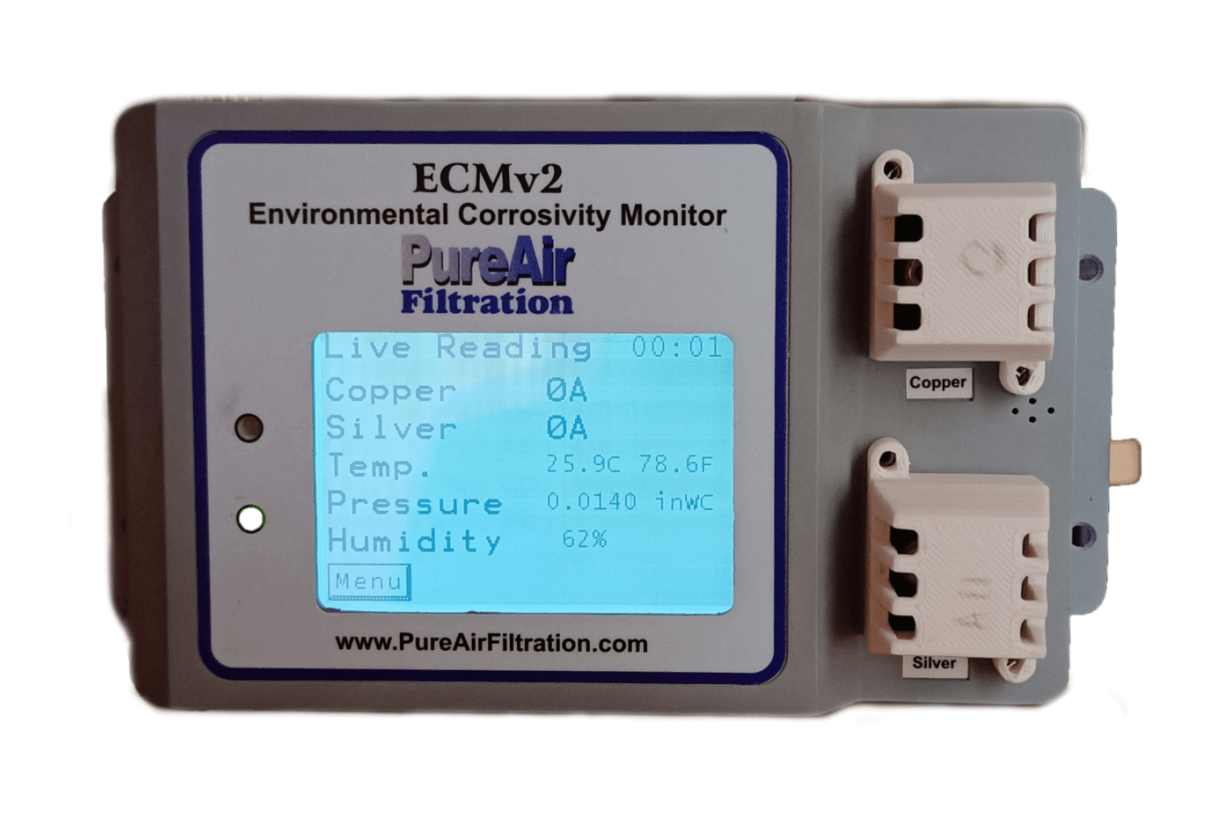ISA Standard for Corrosion: Compliance with PureAir®
In 1985, the American National Standards Institute (ANSI) and International Society for Automation (ISA) first published ISA Standard 71.04-1985, one of the most widely used industrial standards for the protection of electronic equipment. The standard was updated in 2013 (ISA S71.04-2013), following the RoHS Directive 2011/65/EU (Restriction of Hazardous Substances), which restricts the use of lead, mercury, cadmium, hexavalent chromium, PBB and PBDE in electrical and electronic equipment.
ISA Standard 71.04-2013 Reactive Monitoring
ISA S71.04-2013 offers a classification system using reactivity monitoring to determine the potential corrosive impact of an environment as it relates to electronic equipment. It relies on the Silver/Copper Corrosion Test to provide a quantitative measure of the overall corrosion potential of an environment.
Industries Affected by Corrosion
- Pulp & Paper Mills
- Refineries
- Mining & Steel Plants
- Chemical Plants
- Motor Control Centers (MCC)
- Drive Rooms
- Operator Control Rooms
- Rack Rooms
- Laboratories
- Administrative Buildings
- Any environment that has sensitive electrical equipment
Maintain Compliance with PureAir®’s Air Quality Monitoring Solutions
Corrosivity Test Kit

This test kit consists of a strip of silver and copper that is hung in the applicable room for 30 days. The test kit is then sent back to PureAir®’s in-house lab to process the corrosion levels on the copper and silver plates. Analysis of the results determine which type of gases caused the corrosion and the quantities of each gas. Based on the analysis, the PureAir® team will recommend a solution to remove the applicable gases from the room.The Environment Corrosivity Monitor (ECM), offers live, accurate results of environment surveillance and detection of corrosive gases without lab testing.
Environment Corrosivity Monitor (ECMv2)

The ECMv2 delivers live, accurate results of environment surveillance and detection of corrosive effects on copper and silver. This innovative tool provides the benefits of constant environment surveillance, SD card data storage, easy installation, and long service life.
- Early corrosion detection
- LCD display of corrosion and corrosion rate for each channel
- Humidity, temperature, and room loss differential alarms
- Pressure LED indicator for ISA environments classification
- Can NOT specify the type of gases causing corrosion
Combat Corrosion with PureAir®’s Dry Scrubbers
A variety of gases can have corrosive effects on a building, fixtures, and equipment. Corrosive gases can result from automotive emissions, fossil fuel, tobacco smoke, cleaning products, airport/jet and diesel fuel, sewage treatment, kitchen and odor exhaust, urban pollutants, cleaning compounds, and food manufacturing. These corrosive gases include:
- Hydrogen Sulfide (H2S)
- Sulphur Oxides (SOx)
- SO2 and SO3
- Nitric Oxide (NOx)
- Chlorine (Cl2), Chlorine Dioxide (ClO2)
- Hydrogen Fluoride (HF)
- Nitrogen Oxides (NOx)
- Ammonia (NH3)
- Ozone (O3)
Corrosion is an expensive problem that can lead to production losses, plant interruptions, accidents, premature equipment replacement, as well as unscheduled downtime.
PureAir®’s dry scrubbers equipment for combating corrosion include:
- Side Access Housing (SAH)
- Packaged Filter Unit (PFU)
- Packaged Filter Compact Units (PFU-Mobile & PFU-Mini)
Silver/Copper Corrosion testing and monitoring in keeping with the requirements of ISA-71.04-2013 is necessary for a growing list of applications including chemical manufacturing, refineries, mining, steel manufacturing, geothermal facilities, paper manufacturing, data centers, and other areas where preventing electronic equipment downtime is essential.
Contact us to discuss how we can meet your gas removal and corrosion protection needs.
| ISA CLASSIFICATION | ||||
|---|---|---|---|---|
| G1 | G2 | G3 | GX | |
| Mild (Acceptable) | Moderate | Harsh | Severe | |
| Corrosion is not a factor | Corrosion is measurable | High probability that corrosion attacks will occur | Electronic/electrical equipment is not expected to survive | |
| Copper Reactivity Level | 0-299 Angstroms | 300-999 Angstroms | 1000-1999 Angstroms | ≥ 2000 Angstroms |
| Silver Reactivity Level | 0-199 Angstroms | 200-999 Angstroms | 1000-1999 Angstroms | ≥ 2000 Angstroms |
| Contaminants | Concentration | |||
| H2S Hydrogen Sulfide | < 3 ppb | < 10 ppb | < 50 ppb | ≥ 50 ppb |
| SO2 Sulfur Dioxide | < 10 ppb | < 100 ppb | < 300 ppb | ≥ 300 ppb |
| CL2 Chlorine | < 1 ppb | < 2 ppb | < 10 ppb | ≥ 10 ppb |
| NOx Nitrogen Oxides | < 50 ppb | < 125 ppb | < 1250 ppb | ≥ 1250 ppb |
| NH3 Amonia | < 500 ppb | < 10,000 ppb | < 25,000 ppb | ≥ 25,000 ppb |
| O3 Ozone | < 2 ppb | < 25 ppb | < 100 ppb | ≥ 100 ppb |
| HF Hydrogen Fluoride | < 1 ppb | < 2 ppb | < 10 ppb | > 10 ppb |
| ISA CLASSIFICATION FOR GLAM | |||||
|---|---|---|---|---|---|
| CS/S1 | C2/S2 | C3/S3 | C4/S4 | C5/S5 | |
| Archives, Metal, Collections, Rare Books | Museums, Museum, Storage, Libraries | Historic Houses | Short Term Acceptable | Not Acceptable | |
| Copper Reactivity Level | Silver Reactivity Level | ||||
| Class | Air Quality Classification | Corrosion Rate per 30 days | Class | Air Quality Classification | Corrosion Rate per 30 days |
| C1 | Extremely Pure | < 90 Angstroms | S1 | Extremely Pure | < 40 Angstroms |
| C2 | Pure | < 150 Angstroms | S2 | Pure | < 100 Angstroms |
| C3 | Clean | < 250 Angstroms | S3 | Clean | < 200 Angstroms |
| C4 | Slightly Contaminated | < 350 Angstroms | S4 | Slightly Contaminated | < 300 Angstroms |
| C5 | Polluted | ≥ 350 Angstroms | S5 | Polluted | ≥ 300 Angstroms |


